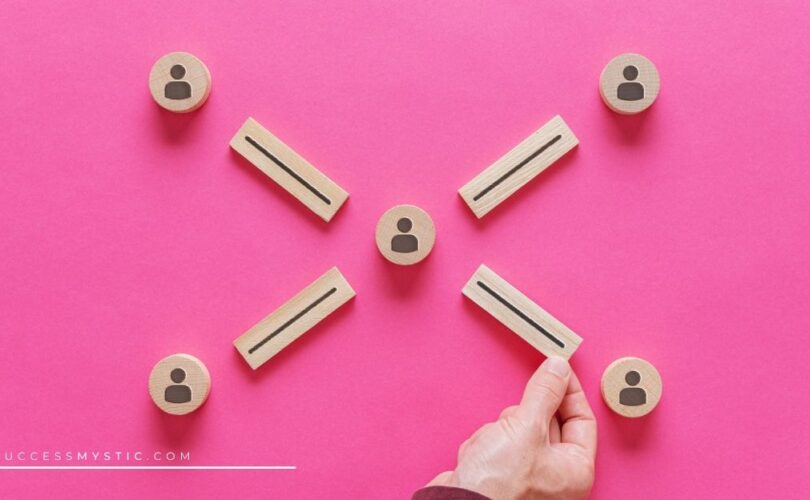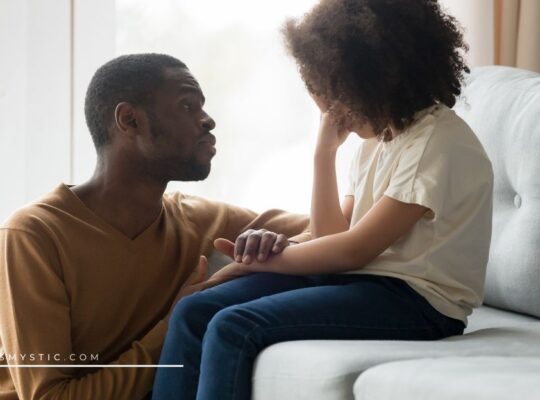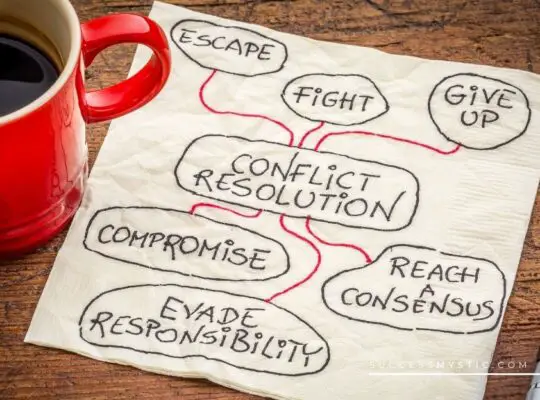How many friends do you have? No, I don’t mean Facebook friends or people you ‘know’. I mean actual friends. People you could call any time and know they would be there for you if you needed them. For most of us, that number is pretty small. Or maybe really, really small.
As we get older, many people find that their relationships are not as fulfilling as they would like for them to be. They lack strength or depth, so to make up for this, we focus on cataloging more ‘friends’ to help better. The focus on superficial bonds in your society has left many people feeling left out or disconnected from others. But it does not have to be this way.
Building strong relationships is a skill, just like any other. You need to focus on it, figure out your priorities, and work at it every day. You can have strong connections to others in your life if that is what you want, and this guide can show you how to do that.
What is a Good Relationship
Understanding what makes a healthy, strong relationship is vital for learning to build better connections in your life. The following are characteristics that describe healthy bonds, regardless of the nature of the relationship.
- Mutual respect- This includes valuing the other person for who they are, knowing that they also value you. Respect also means that you honor the others’ boundaries.
- Trust- Along with respect, trust is a foundational element to any relationship. When you trust someone, you know you can rely on them when needed and that they will be there for you. You also give others the benefit of the doubt when you trust them. Trust allows you to express yourself honestly and helps ensure effective communication.
- Communication- Your ability to speak honestly, share, and be heard by the other person is crucial to a strong bond. Recognizing your personal communication style and that of the other person is also essential.
- Emotional control- Regardless of the type of relationship you have with someone, they want to know that your emotions will not always be the focus of your interactions. Managing your own emotions means you can enjoy the company of others without always relying on them to help you through a turmoil. Learning to express your emotions in a healthy way is a crucial part of interacting with others.
- Individuality- Your relationships should allow you to be yourself and follow the beliefs and values that are important to you. Likewise, you should value others for their unique gifts and perspectives. Healthy relationships encourage the other person to grow and learn so that they can be happy.
- Empathy– When you care about someone, you try to see things from their point of view and honor their needs and perspectives in life.
- Responsibility- You must accept responsibility for how your words and actions may affect others, and you should be able to expect that from them, as well. Being mindful of your influence on others is necessary for establishing healthy connections.
The Types of Relationships You Need
Now that we have looked at the characteristics of a good relationship, we should also consider the various types of purposes for connections to other people. There are lots of reasons why you may be connected to someone else, and each of these relationships has its own purpose and unique qualities.
You have a vastly different connection, for example, with your mother than you do with your mail delivery person. Your relationship with your child is quite different from yours with your boss.
The more relationships you have in your life, and the more varied those connections are, the richer your life becomes. Being connected to many different people with various ways of enriching your life means you can learn from multiple perspectives, rely on lows of support from people when you need it, and enjoy interesting conversations and experiences when you with them.
The types of relationships we have vary in many ways, but they mostly fall into one of the following categories.
Family- This includes everyone from your parents, siblings, stepparents, grandparents, extended family, children, guardians, in-laws, and other familial connections. This group may also include those who feel like family but are not legally or genetically so or those who help to take care of your family, including caregivers, nannies, nurses, and other support staff.
Peer group members- These are all the people in your life that are included because you love their company and choose to remain close to them. While this includes friends, it can also include people like pen pals and neighbors.
Intimate relationships- This group includes everything from sexual partners to spouses. Romantic relationships may last a brief time or decades. Whether legal or not, long-term relationships like civil unions, domestic partnerships, common-law marriages, and other forms of union fall into this category.
Organizational connections- You are also a member of many different groups based on where you live. You may not be active in all these groups, but you are connected to your local, state, and federal government, and you have a relationship with the various people who keep our society safe, protected, and running smoothly, like law enforcement, emergency service providers, teachers, and librarians. Charitable organizations, schools and universities, and other organizations that contribute to the greater good are included here.
Professional relationships- These include all the connections you have related to your job, including with coworkers, suppliers, customers, managers or supervisors, and clients.
There are probably hundreds of diverse types of relationships, depending on how you classify them. Some place them into categories by how close or intimate your connection is while others may sort them by what the relationship brings to your life. Regardless of how you label them, having many different types of relationships helps you be healthy and happy person.
Why Relationships Are Important
So, why are healthy, strong relationships so important to our lives, anyway? Humans are, by our very nature, social creatures. We are happiest and healthiest when we have positive interactions with other people, and we crave connection to others in the same way we need water and food. Our inherent desire to become close with others is what makes us unique among the animal kingdom.
There are many ways that having positive relationships can benefit your life. Whether it is romantic love, close friendship, or familial bonds, being linked with others can improve your experience in many ways. Here are just a few.
Lower Levels of Stress
When you have others in your life on whom you can rely, you are more likely to have less stress in your life. Those who are in committed relationships, for example, respond more productively to psychological stress. Having the support of friends, family, and partners can help you cope with intensely stressful times in your life, and there is much evidence to show that those who have a more extensive social network are more likely to bounce back from hardships and failures than those without much support.
A Sense of Purpose
When you feel needed and wanted by others in your life, you feel like you have a purpose and that your life matters. When you help others, you feel like you are improving the world or making it better for at least one person. Loving others contributes to your sense of well-being and enhances your sense of purpose in many ways.
Improved Healing
Those who have stronger connections to friends and family are much more likely to recover fully and bounce back more quickly from a serious illness, injury, or surgery. When you know you have others you can rely on for support, you are less worried about your recovery, which helps you heal faster. And those with an extensive support system are more likely to get better care and to experience fewer complications. The emotional support that these connections bring to your life is invaluable during times to healing or crisis.
A Longer, Healthier Life
When you have healthy relationships, you are more likely to be healthier overall. Your friendships play a significant role in your adoption of habits, so the healthier and more active your friends are, the healthier and more active you will be.
Your connections place a role in how well you avoid certain unhealthy habits like smoking or using drugs, too. And having a wider social circle later in life is also correlated to living longer.
Sustaining Current Relationships
Throughout your life, you are always building connections to other people. Significant shifts in your life, such as changing jobs or moving to a new place will lead to the formation of new bonds and the extinction of others. While some people may play a more utilitarian role in your life, others may serve a significant purpose but for only a limited time.
Even established relationships require careful attention and effort, though. Taking someone in your life for granted is an easy way to ensure that relationship will not last much longer. It is necessary to pay attention to all your relationships, no matter their level of intimacy, and to give them the attention they warrant in your life.
One of the factors that will influence your ability to sustain and grow your connections with others is time. You must take the time to check in with your closest relationships from time to time. What has changed, what do you need, what does the other person need? While it can be hard, especially for those you do not see every day, this is a crucial factor that shows you are invested in the relationship.
Learning to resolve conflict is an important skill for everyone to have. Most relationships, except those that are superficial or tangential, will encounter some conflict at one point or another. If the bond is crucial to you, then you should know practical strategies for finding solutions to your problems and learning to compromise with others. Learning how to forgive, compromise, and listen to other people are all important for resolving issues as they arise.
Listening is one skill that will help in every relationship in your life. When you listen, you develop empathy for others, and the act of focusing on the words and actions of another person shows how important they are to you. Listening engenders trust, shows support, and can deepen the relationships in your life.
Becoming more self-aware can also help you to nurture existing connections. As you know yourself more, you are better able to genuinely connect with others, to ask for what you need, and to define the boundaries that make you happier.
So, how do we combine these into specific actions that can help each of us build healthier, stronger relationships? Next, we share the best strategies to accomplish this goal.
16 Strategies to Build Healthy Relationships
1| Do a Relationship Assessment
When it comes to any relationship in your life, it must fulfill a need that you have. That need may be practical, such as helping you do your job more effectively, or it may be emotional. Do you know what it is that you need from other people, and are you aware of what others may be needing from you?
Before you can connect with someone deeply, you should be clear about the purpose they serve in your life and you in theirs. If you want to build a stronger connection with someone, assessing these needs can help you figure out where to focus your efforts.
2| Work on Your Listening Skills
Listening is by far the most critical communication skill in any relationship. And while we all think we are excellent communicators, most of us could really use some help when it comes to listening. Listening is so much more than waiting for the other person to be done talking so you can say what you want.
Listening involves actively focusing on the other person, paying attention to their words as well as their nonverbal cues, and processing what they are saying before you respond. Try to become a better friend or partner by practicing active listening and working on your skills at not just hearing but understanding what others are saying.
3| Connect with More People
Meeting lots of new people is an important part of your relationship-building process. Think about this. Close connections do not form with every single person you meet, right? And if you only meet new people every now and then, you are limiting the number of potential good friends or partners that you have in your life.
The more people you are meeting and connecting with, the more likely you are to find one or a few with whom you have lots in common, and you want to establish a deeper relationship. Joining clubs or organizations, going to events and parties, and engaging in activities with other people are great ways to meet new people who all have the potential to become an excellent friend or a romantic interest later.
4| Prioritize Your Relationships
If building your relationships is important to you, then you need to prioritize this activity in your daily life. Put in on your calendar, make it a to-do on your daily list, but find a way to include your relationships in your daily activity.
Little interactions can mean a lot and become the foundation for a more meaningful relationship later, too. But, remember that if it is essential to you, you will find the time to do it.
5| Be Vulnerable
When connecting with others, your instinct may be to try and always put your “best foot” forward, but in reality, hiding your shortcomings or failures from others is not a positive way to build a relationship.
None of us are perfect, and when you know someone who is always trying to be, it makes you trust them less or believe in little they say. Do not be afraid to share your vulnerability with others, to allow your human nature to show. When you do, you will see that others connect with you more, not less, because they know that you are just like them.
6| Share Your Passion with Others
The people in your life will feel closer to you when they realize the things you share in common, including interests, values, and hobbies. Talking about those things in life that matter the most to you can help others to know the real you and find ways in which their lives intersect with yours.
Common ground is the basis of any strong relationship, so the more you share your life and interests with others, the more likely it is that they will recognize ways you are similar.
7| Show Your Appreciation
When you have good friends or loved ones in your life, be sure to let them know you are grateful for their caring and connection. Everyone likes to feel appreciated, and when you share your gratitude with others, it makes them feel unique and consequential. Sharing your gratitude with your actions and not just your words really demonstrates their importance in your life.
8| Pay Attention to Non-Verbal Cues
You can learn a lot about someone just by watching their face and body language. When you are with people you care about, look for nonverbal messages that tell you how well they are doing, if they are struggling in their life, or if they really mean it when they say they are “fine.” Pay attention to these meaningful forms of communication to help you connect with others and show real interest in who they are and what they are experiencing in their lives.
9| Be Prepared for Conflict
Every relationship has its good times and its bad. We are not always happy, and things are not always going to be great between you and other people. When you commit to caring about someone else, that does not mean that you will always agree or that you will not go through periods where the other person becomes less of a priority in your life.
Recognizing that this is normal and expected in any relationship is helpful. Developing strategies for resolving conflict will also enable you to get through the tough times. But, staying committed to your relationship will be necessary for its long-term success.
10| Focus on the Positive
When building bonds with others, it is essential to focus on the positive aspects of your relationship. While it is unrealistic to assume everything will always be perfect, striving for a 3:1 ratio of positive interactions to negative ones is the ideal balance for maintaining long-term connections with others. The more positive you are, the more positive the other person will be, too.
11| Be Genuine
Great relationships are built on mutual understanding, trust, and caring. It is impossible to love or care for someone when you do not really know them, which is why it is vital that you be yourself with others.
Being comfortable in yourself shows others they can love themselves, too. Want the best for others in the same way you want it for yourself. The more you can be yourself, the more you show others that you want them to share their true colors, too.
12| Show Integrity
Each of us has a set of beliefs and values. And we choose our actions and words in everything we do. When you have integrity, how you behave is congruent with your beliefs and values, and this is known as having integrity. Those with integrity can be trusted to do what they say they will do and to say what they think.
These traits are vital for developing trust, which is a pillar of effective relationships. Learning to be honest with others and provide genuine feedback shows you care for their overall success and happiness and that they can rely on you to say what matters, even when it may not be easy to hear.
13| Be Aware of When You Share
Everyone has met that one person that, within the first 30 minutes of knowing them has shared their entire life story, medical history, and sexual preferences. And chances are high you no longer know or talk to that person. Why? Because sharing everything all at once is not how you build secure connections in most cases.
Instead, some of the best relationships are built on time and slow building of bonds. Instead of oversharing with everyone all the time, try pacing yourself and sharing when it is appropriate to do so. Consider how much you know about the other person before sharing something about yourself. Consider asking the other person questions instead of always just telling more about yourself.
14| Share and Honor Your Boundaries
Relationships can be found in all parts of our life, from work to our personal lives. It is important that you set boundaries for how close you allow those relationships to become so that they do not impact your connections.
For example, a work friendship could not interfere with your ability to do your job. Your love life should not be the topic of conversation while in the office, either. Additionally, you have boundaries for what you need and expect from others, and you should be sure that you are honoring those by communicating them to others when needed.
15| Get Your Emotions Under Control
We all have that one friend who has a different mood swing for every day of the week or is always in the midst of an emotional crisis. When someone demands so much of your emotional capacity, it can be hard to maintain a meaningful connection. Because you are always putting your own emotional needs aside for them, it can feel like your relationship is very one-sided.
Learning to manage your own emotions is crucial to being a better friend or partner with others. When you have strong emotional health, others are much more likely to recognize and step up when you need real help during a tough time. And when your emotional crisis prevents you from being fully present in your relationship with others, being honest is the best option.
16| Be Supportive
One lesson that can be hard to accept when it comes to your relationships with others is that they are different from you and, no matter how much you think it will benefit them, other people are not going to change just because you think they should. Instead of focusing on how you could improve someone’s life, instead focus on supporting them.
Kind words and supportive actions mean more to relationships than being “right.” And if they do make a mistake or it turns out just like you expected, remain supportive and be there for them as they find ways to move on.
Eventually, they will see what you were trying to suggest as well as how you allowed them to make their own mistakes, and this will mean more than any “I told you so.”
Final Thoughts
We all need other people in our lives. Relationships are what bind us together, lift us up, give us hope, and allow us to keep moving forward when things are tough. And yet, most of us do not prioritize the cultivation and nurturing of our connections to others.
Learning to build your relationships and find new ones is not hard, but it does take time and dedication. It takes a commitment to work on your bonds, to listening and being there for others, and to showing up when you are needed.
Relationships, whether friendships, family bonds, or romantic links, can keep us healthier, reduce our stress levels, and even help us live longer, all while adding happiness, satisfaction, and purpose to our lives.
And it is only through the continued management of these bonds that they grow and deepen over time. Stop ignoring your relationships and start giving them the attention and care they deserve.







